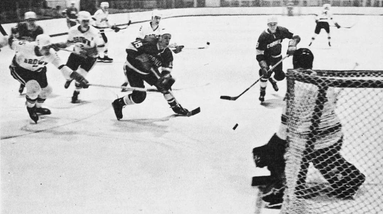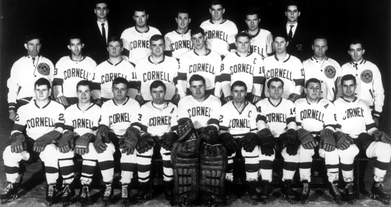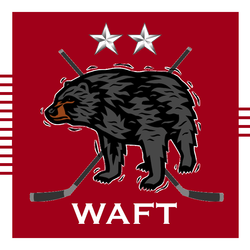Harkness helmed his first Cornell team in the 1963-64 season. He would not lead the Big Red into the postseason until the 1965-66 season. That season Cornell defeated Boston College and Boston University en route to a meeting with Clarkson in the 1966 ECAC Championship Final. The Golden Knights defeated the Big Red at Boston Garden.
When the 1966-67 season began, sophomore goaltender Ken Dryden joined Cornell's varsity roster after his time with Cornell's freshman team. All of Cornell's top five scorers from the 1965-66 season returned including seniors Doug and Dave Ferguson, Murray Death, Harry Orr, and Mike Doran. These scorers would be joined by reinforcements from the 1965-66 freshman team with Pete Tufford and Bob McGuinn joining their ranks.
Drama would not leave the 1966-67 team unscathed. Ned Harkness was uncertain whether he should entrust the ambitions of his team to an untested sophomore netminder. Senior Errol McKibbon and junior Dave Quarrie had shared time between the pipes for Cornell during the 1965-66 season. Dave Quarrie had shown marked improvement between his sophomore and junior seasons.
Dave Quarrie produced a goals-against average of 1.99 and a save percentage of 0.912 during his junior campaign. Ned Harkness expected to give senior Dave Quarrie the nod over sophomore Ken Dryden at the outset of the season. Fate then intervened. The senior netminder injured his ankle before the first face-off of the season. The defense of Cornell’s net belonged to Dryden.
The 1966-67 team in front of Ken Dryden resolved to ensure that the untested, towering sophomore would benefit from the best defense in the nation throughout the season. Cornell pummeled teams into submission. Ken Dryden shone. Legends of Cornell hockey emerged.
The Big Red outscored its first two opponents by a margin of 21 goals to four goals. The Engineers of RPI had grown to distaste Ned Harkness’ homecomings. Ken Dryden proved his invaluableness to his team at Walker Arena in November 1966. Dryden held off a late-rallying Clarkson team and gave Cornell the chance to win in overtime, which the Big Red did. The skaters from East Hill realized they had as much or more talent than the previous season’s squad.
Harkness and the 1966-67 team tasted victory at Boston Garden in the 1966 Boston Garden Christmas Tournament. Cornell toppled Northeastern and claimed the title of the tournament with a victory over then-defending national champion Michigan State. Cornell lost only one game that season. Yale defeated Cornell in January 1967.
Cornell with a regular-season record of 22-1-1 earned the second seed in the 1967 ECAC Tournament. Dryden was undefeated in all of his appearances during every regular-season game that he tended the Big Red's pipes. Cornell's first opponent was Brown. Cornell had defeated the Bears by a cumulative score of ten goals tallied to three goals allowed during the regular season.
The ECAC Quarterfinal clash between Brown and Cornell was never in doubt. Cornell scored within the first eight minutes of the first frame and left for the first intermission up 4-0. Brown would solve Dryden twice, but it would be to little avail. Bob Ferguson and Mike Doran would each tally a hat trick. Doug Ferguson would not complete his hat trick. Cornell won 11-2.
The 1967 ECAC Championship Semifinal at Boston Garden was a rematch of the 1966 ECAC Tournament Quarterfinal between Boston College and Cornell. The Big Red won the preceding postseason meeting 9-0. Even though Dryden would not produce a shutout, Cornell would improve upon its margin of victory from the previous ECAC Tournament. Jerry York captained the Eagles, but Cornell made quick work of his squad grounding them 12-2.
Cornell entered the 1967 ECAC Tournament with many detractors claiming that the slower carnelian-and-white skaters had lost their scoring touch. A Red offensive wave outscored its opponents 23-4 in the first two games of the 1967 ECAC Tournament. The final game that decided the 1967 ECAC Champion would be different.
Boston University and Cornell had met in the 1966 ECAC Championship Semifinal. The animosity required of a rivalry already had begun to fester. The 1967 ECAC Championship Final solidified the development of the Boston University-Cornell clashes as rivalrous. Doug Ferguson connected on three of Cornell's four goals. He assisted on Cornell's first and fourth goals while scoring the second off of a feed from his brother.
Cornell would win by a margin of 4-3. Cornell would recover from a 2-1 deficit at the end of the second period to lead 4-2 in the third. The Terriers clawed back for one more tally, but Cornell's fourth goal would stand. Senior Mike Doran scored the championship-winning goal with just over eight minutes remaining in the third period. Cornell outscored its opponents 27 to seven in the playoffs. Dryden produced a goals-against average of 2.33 and 0.923 save percentage over the course of the 1967 ECAC Tournament.
Cornell's victory at Boston Garden on March 11, 1967 gave Cornell its first postseason tournament win in the modern era and guaranteed Cornell its first trip to the NCAA Tournament.
Paul Althouse, Brian Cornell, Ted Coviello, Wayne Currie, Murray Death (C), Michael Doran, Ken Dryden (G), Andrew Crowley, Dave Ferguson (C), Doug Ferguson, Robert Ferguson, James Gately, Robert Kinasewich, Thomas Kostandoff, Terrence McGlashan, Robert McGuinn, Albert McNaught, Harry Orr, Bruce Pattison, David Quarrie (G), Kennedy Smith,
Walt Stanowski, George Swan (G), James Taverner, Pete Tufford, Richard Wakeman, Murray Watkinson
- Navigate the Rafters -










 RSS Feed
RSS Feed
